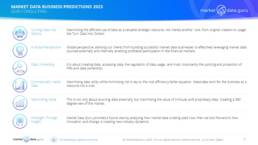
WHAT ARE WE LOOKING OUT FOR IN 2023?
Exchanges, Data Sources and vendors, will discover their existing business and pricing models don’t work for them, nor their clients, nor their potential new markets in a world where the banks have hit information saturation point. Basic principles of ownership, IPRs, and charging for usage won’t disappear, indeed MDG believes going forward these become more important, not less, however data workflows, processing, have changed, there has been a massive expansion in the number and types of data consumer driven by increased access to data, which The Cloud will only accelerate.
Given all this, it should lead to an overhaul in business strategies, pricing models, data workflows and partnerships. Improved structures should be targeting two specific areas, firstly tailoring services and pricing around real world market data usage, and secondly the high levels of revenue leakage that is occurring though poor and ineffective reporting. By adopting smarter business models this will also have the added benefit of blunting the impact of ill-informed regulators will almost certainly have if they seek to gerrymander the data marketplace.
Likelihood of happening in 2023, sadly low but should at least be debated.
Here are our 5 thoughts on New Business Models opening up new revenue streams:
1.New Business Strategies
2.Flexible Pricing Models
3.Greater Emphasis on Data Workflows
4.Leveraging Partner Creativity
5.Better Compliance & Reporting
INDEPTH ANALYSIS
1.New Business Strategies. As the limitations of relying upon providing simple price data kicks in, usually once an organisation hits deriving around 15% of total revenue from market data, the struggle becomes overcoming the barrier to the next level of business development without taking the lazy option of just raising fees. Fortunately, there are a plethora of options, especially in offering value added services, like analytics, developing indices, expanding into new markets like processing.
However, if it were as simple as that, more exchanges and vendors would already have made the move. Cruelly identifying the most appropriate opportunities is not straightforward, for instance buying a risk analytics solutions provider for fixed income will not instantly supply a tool for other asset classes. Also, competitors like ICE, LSEG, MSCI, NASDAQ, S&P Global have been very active in spotting and acquiring assets backed by financial firepower few can match, which means smaller organisations need to be smarter in devising then implementing badly needed new business strategies.
2.Flexible Pricing Models. There is an argument that exchanges and vendors offer flexible pricing models, well most data consumers would retort they have become too complex and opaque, coming with contradictory policies and poor licence agreements.
To generate increased revenue greater transparency is required for existing clients. To enter new markets pricing models fixated upon simple distribution and usage by financial institutions are not going to work, especially mass markets where volume dominates. Both exchanges and vendors need to think in terms of comparing Moreton’s steaks with MacDonald’s burgers when pricing across an ever more disparate and diverse client universe.
3.Greater Emphasis on Data Workflows. Traditionally neither exchanges nor vendors have thought in terms of data workflows, just assuming there was a linear progression from publishing to consumption. In the data multi-verse this attitude must change as data workflows are the foundation of information usage, especially as this is how their pricing models function in practice.
It is all about knowing and then identifying who is consuming data, where, how, plus the upstream/downstream impacts. This means tools to do the job (and there are some very good ones out there), from accounting to data management, but also interpreting the reports and outputs generated, and understanding what they mean. Amazingly most data sources and vendors do not do this. On the other side, the data consumers should be doing the same thing.
4.Leveraging Partner Creativity. Exchanges and data sources really ought to know by now they are not technology companies, they are trading venues with information services businesses, whereas vendors are technology driven that make money out of providing data solutions. Like certain Banks have now discovered their business is actually finance, not building systems.
The Point? In order to have a successful business do what you are good at, and partner with those who add value with what they are good at. Perhaps that means M&A, though it can sometimes turn a revenue source into a cost. The alternative is to develop partnerships beyond the basic provision of price data that provide reach which otherwise would not be there, for instance in risk, compliance, analytics, and reporting. This can be done through marrying specialisation with connectivity, i.e. leveraging Data Malls
5.Better Compliance & Reporting. The reasons why exchanges and vendors should be so focused on better compliance and reporting were discussed in our Market Data Business Predictions Number 4, what we did not cover is how. So much data revenue leakage occurs because of poor and incomplete reporting driven by a lack of adequate management tools, while missing the analytical capabilities to understand what the problem is and where it lies.
It does not help that many exchanges and vendors find it easier to ignore the issue instead preferring to rely upon outdated concepts of audits and charging back dated fee liabilities as a way of generating revenue for the business. Audit programmes have their place, but they are ineffectual relative to the scale of the problem, focus on the same financial institutions, and often lead to bad blood. The alternative is to understand most data consumers do want to be compliant, and are willing to work with data sources adopting a ‘go forward’ strategy based upon identifying the problem and engaging instead of searching in hope.
SUMMARY
It is a fair question to ask, ‘Why should we change?’, after all the market data industry is highly profitable, built on firm foundations and got a solid future with more businesses wanting to get in than out.
The reality is while the market data industry will go on, many players within it will not, and given history their demise will be attributed to legacy thinking, inertia, or just plain laziness. Each of these three reasons have a single causality, failure to evolve.
Better Business Models for 2023
- Create a Friendlier Compliance Model. Move from reactive to proactive compliance strategies, produces fairer revenues faster
- Limited Pricing Strategies Limits Client Usage. Given market data models are usage driven, common sense suggests making it easier for data consumers to want to use the information by adopting more flexible pricing models. Already fees are charged by usage, and the principles can be expanded by leveraging the differences in dynamics between markets
- Expanding the Client Base. Exchanges and vendors need to go beyond the traditional consumers of their price data, the ability to offer new products and services by adding value such as analytics enables reach to be extended in terms of breadth and depth to new clients
- Emphasise Know Your Client, through getting on top of data workflows, plugging into the data multiverse by analysing outputs from management and reporting tools. Understanding change as it occurs.
- Going it Alone Leads to Dead Ends. All of our predictions have a common theme, engagement, data businesses are all about partnerships and the sum of the parts is usually greater than the whole because of specialisation. Third parties bring reach, expertise, and revenue that often do not exist internally.
For market data businesses 2023 ought to be about developing business strategies and models then looking at themselves in the mirror, yet too many will be afraid of suffering the fate of Dorian Gray.
Keiren Harris 14 February 2023
Please contact info@marketdata.guru for a pdf copy of the article
For information on our consulting services please email knharris@datacompliancellc.com


